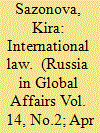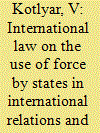| Srl | Item |
| 1 |
ID:
146262


|
|
|
|
|
| Summary/Abstract |
International developments over the last three to five years have created a situation where questioning the practicality of international law, criticizing it for being inefficient and weak, and predicting, with a thoughtful air, its immediate collapse has become not just a commonplace but dominant mode of behavior among many Russian and foreign historians, political analysts and international relations experts. Indeed, the situation does not look encouraging: the cumbersome and overly bureaucratized United Nations; U.S. attempts to establish a unipolar world based on the use of force and diktat; a phantasmagoric caliphate in the Middle East, terrorizing the whole world; the "great transmigration of peoples" on the Eurasian continent-this list can be continued endlessly. Against this background, statements about a "leading and guiding" role of international law may seem too pompous.
|
|
|
|
|
|
|
|
|
|
|
|
|
|
|
|
| 2 |
ID:
131867


|
|
|
|
|
| Publication |
2014.
|
| Summary/Abstract |
IN ACCORDANCE WITH the UN Charter, a Bible of contemporary international law, all UN members "shall settle their international disputes by peaceful means" and "shall refrain in their international relations from the threat or use of force" (Article 2, Paragraphs 3-4). The Charter allows, in the form of an exception to this general rule, states to use force in only two cases - as self-defense against an armed attack from the outside (Article 51) and, following a UN Security Council (UNSC) decision, to remove a threat to the peace, breach of the peace, or act of aggression (Articles 39-42).
|
|
|
|
|
|
|
|
|
|
|
|
|
|
|
|
| 3 |
ID:
144977


|
|
|
|
|
| Summary/Abstract |
IT IS WITH GOOD REASON that we speak of the legal thought of Russia, and the school of Fyodor Martens, in the first place, as part of the contemporary doctrine of international law, a common heritage of the European legal tradition. His school was completely devoted to the principles of international law and the rule of law as the linchpin of foreign policy of all civilized states that rejected force as a means of settling interstate disagreements and a tool of prevention of European clashes.
|
|
|
|
|
|
|
|
|
|
|
|
|
|
|
|